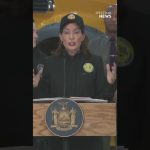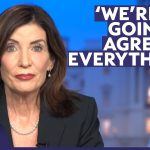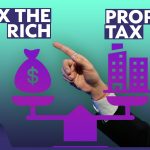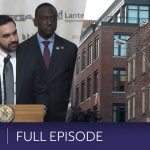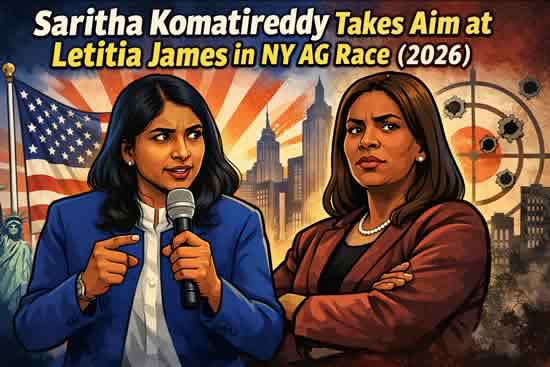New York . Dan Garodnick, Director, Department of City Planning: Okay, good morning. Good morning, everyone. Thank you so much for joining us today. I’m Dan Garodnick, director of the Department of City Planning. I want to acknowledge some of the administration officials who have joined us today.
I will introduce the mayor of course in a moment, but we have Maria Torres Springer, deputy mayor for Housing, Economic Development and Workforce. Kevin Kim, commissioner of the New York City Department of Small Business Services. Thank you, Commissioner. Jeff Garcia, executive director of the Office of Nightlife, a popular one. We have BJ Jones, executive director of New New York. Andrew Kimball, president and CEO of the New York City Economic Development Corporation. Rob Holbrook, the executive director of Get Stuff Built. Let’s give them a big round.
We are here today because the City Council, in a couple hours, is going to hold a hearing on an important proposal, City of Yes for Economic Opportunity. We’re joined today by advocates from across the city who have come out in support. We have support from the five boroughs, Chambers of Commerce and Business Improvement Districts. From planning and smart growth groups. From dance and nightlife advocates who are making our morning a little more exciting. From science, life science researchers and industrial services providers and many more. As you may know, many of our zoning rules that govern business and manufacturing have been in place since 1961. They are laughably outdated. They are holding back our city.
They still call out typewriter repair shops and telegraph offices, but not cell phone stores or virtual reality. Fortunately, our mayor has charged us with updating these rules so that we can be a City of Yes. Yes to innovation. Yes to entrepreneurship. Yes to dancing. Yes to good jobs. With that, it is my great honor to introduce the mayor of the City of New York, Mayor Eric Adams.
Mayor Eric Adams: Thanks so much, Dan and this entire group of amazing New Yorkers who watched the really how we stymied business and really did not listen to business leaders. I think about Rafael when he was a city councilman and he dug into how we should allow dancing and cabaret license and things of that nature.
When you look further, we saw that there was discrimination in the entire law. A lot of the laws that we see on the books, they are hidden ways of preventing businesses from growing and preventing people from cross pollinating in different communities. This is such an historic and important day. Much of what we’re doing comes from the people behind us and people like them. Those who run various stores and shops and nightclubs and venues and dance halls. They know that each time we create another law that restricts them, that impacts our economic opportunity.
Today we call on our colleagues in the City Council to make the right decision because some of them have complained about how challenging it is for business leaders in their community to move forward and continue to thrive and grow. We know we can get it done and we must make transformative changes to our city’s zoning code so that our city’s economy can adapt and grow. Government is a living, breathing entity.
It must adapt and grow as time moves on. I think Dan pointed out, when you are still having rules around typewriters but not rules around smartphones, iPads and other entities, it shows we have outlived the rules that are on the book and we need to look in a new direction. Our City of Yes for Economic Opportunity agenda is so important.
When we came into office, our mission was clear, protect the city with public safety, revitalize our economy and make our city more livable. With this revitalization of the economy, we must look at the rules that we are impacting the opportunity to do so. It’s crucial for us that New Yorkers know that zoning laws can restrict housing supply. We have a 1 percent housing vacancy rate and when you look at affordable housing, it’s down to almost zero. We know that if we innovate, we can continue to expand and grow as a city, but it also is an opportunity for us to see what opportunities are still out there and attract new businesses to the city.
Far too often when I speak with my colleagues across the country, I hear how people state it is too challenging, too difficult to do business in New York City. We’re the empire state. We’re not the state that destroys empires, so we need to get back in the business of building empires. That small dance hall should turn into a chain of dance hall. That small computer store should turn into a chain of computer stores. We should become a magnet for new ideas and new business and that is the City of Yes for economic opportunity plan is about.
A set of 18 zoning changes that would update decades old zoning codes. It will modernize regulations in an effort to support new business and create jobs. It will help revitalize commercial corridors, build vacant storefronts and boost our economic recovery across the board. We said too many vacant storefronts that could be used differently and more successfully if we if it’s given the opportunity to do so.
The City of Yes for economic opportunity initiatives includes plans to foster mixed use neighborhoods with more kinds of businesses in more kinds of places and will update zoning laws that prevent certain kinds of businesses in specific neighborhoods. For example, arbitrary rules that ban hardware stores or repair shops on Madison Avenue like people on Madison Avenue don’t need a screwdriver or repair shop. We need to allow the business to grow where the demand is located or the rules that allow some bars to have music and DJs but not dancing. There’s some people that won’t go on a date with you. They don’t see how well you can dance. Let’s allow people to dance. I say this to New York City nightlife capital of the world. It’s a city that never sleeps and let the people dance. Let the people enjoy themselves. Let’s allow businesses to grow.
We also want to make more space available for small scale clean manufacturing including designers, retailers, artists, crafts people and makers of all kinds. We know that changing zoning rules will help us build our way out of the business crisis and support the green energy revolution that we’re all experiencing but we know it can help us build the economy of the future as well. That is our goal. How do we move our city forward with a 20th century mindset and not stay in the past? This is why we are becoming a City of Yes. We need to say yes to the future, yes to more housing, yes to more business and yes to a future of innovation and opportunity. Today let me say to you all we want to say yes over and over again and continue to watch our city grow and thrive. Thank you very much, City of Yes.
Garodnick: Thank you very much mayor. You are correct to say that as we look to the next city, next 60 years of a city that wants to embrace innovation and opportunities for all New Yorkers, we need rules that reflect a modern economy and that is exactly what we are here today to create. Much of our zoning has not been updated since 1961 and I don’t have to tell any of you that our economy has changed a lot in 60 years but our zoning has not. It is beyond outdated.
Our zoning calls out telegraph repair shops and taxidermy but not 3D printing or virtual reality. In certain commercial corridors you can easily cite a model car hobby center but not laser tag. In a home you can be a music teacher but not an interior decorator. In many places bars can host rock bands but people aren’t allowed to stand up and dance to the music. You can bake bread but you can’t make salsa on a retail street.
What’s happening is that outdated zoning is driving retail vacancies and holding back our neighborhood commercial corridors. New Yorkers are tired of walking past empty storefronts and it is a bad look when the city’s own rules are preventing us from filling them. As we come out of the pandemic with changes in the way New Yorkers are living and working it is clearer than ever that we need an update. If you aren’t bothering anyone, zoning should not tell you what job you can do in your own home or whether you can stand up and dance to music at a restaurant.
Unfortunately there are too many examples just like this and we need to take action and today we have a chance to fix this. That’s why we have been joined today by an amazing group in support of City of Yes for Economic Opportunity. We have supporters here from chambers of commerce, from bids, freelancers, civics, small businesses, industrial service providers, urban agriculture entrepreneurs and people who like to dance. We’re all out here today to say yes to making it easier for small businesses to open and grow and helping reduce storefront vacancies. Yes to the largest expansion of space available for clean manufacturing in over 60 years. Yes to making it easier for life sciences hubs to grow and expand and yes to supporting entrepreneurs and freelancers.
Speaking of freelancers, I am so happy to introduce our next speaker today. A great leader for New Yorkers and my old friend and City Council colleague, the executive director of the Freelancers Union, Rafael Espinal. Welcome.
Rafael Espinal, President and Executive Director, Freelancers Union: Thank you, thank you. Good morning everyone. Before I start any remarks I really just want to be clear in giving my thanks to the mayor for all the work he has been doing and getting this proposal pushed forward. This is the most exciting zoning proposal I’ve seen in my time as a New Yorker because not only are we supporting businesses or freelancers, we’re going to change the culture of New York City in a positive way that’s going to really benefit all New Yorkers and those who want to be here as well.
I also want to thank the commissioner Garodnick who has been on the ground across the city bringing his team out ensuring that New Yorkers know the importance of this landmark rezoning proposal and we’re looking forward to continue working together and ensuring the City Council pushes this forward and votes yes on the floor. Good morning.
I’m Rafael Espinal, the executive director of Freelancers Union and a champion for over for the over 1.3 million independent workers who call this vibrant city home. Today we’re gathered under the banner of opportunity as the City of Yes initiative promises a future where our city’s blueprint matches the ambition of its people. The pandemic wasn’t just a pause, it was a pivot. Now more than ever New Yorkers are embracing the freelance life and opening small businesses but for too long our zoning laws have been relics of a bygone era shackling the true potential of our city’s entrepreneurial spirit.
This initiative would mark the largest expansion of space for makers and artists who are the building blocks of the New York City creative workforce from pottery studios to micro breweries and etsy sellers. The current zoning restrictions forced successful small business owners into distant manufacturing zones. The proposal also aims to update and eliminate discriminatory restrictions on home businesses. In a post-pandemic economy where even full-time employees are working from home, banning home occupations like barbers or interior designers is out of touch with the evolving nature of work.
As a former New York City Council member I’m proud to have led the repeal of the cabaret law. It was a significant step towards eradicating the racist homophobic and outdated legislation. However even as we celebrated this victory I knew that regulatory reform was far from over. I commend Mayor Eric Adams who in this then role who is who in his then role as Brooklyn Board President stood as a steadfast ally. His ongoing commitment to seeing this journey through and enshrining this repeal ensures that New York City’s nightlife is as dynamic as its people. The establishment of the office of nightlife was also a landmark achievement and will be instrumental in ensuring that as we loosen these regulations we do so responsibly, safeguarding the vibrancy of our city’s cultural scene while opening up new avenues for economic growth.
I want to thank Mayor Adams, Commissioner Garodnick and the Department of City Planning. Your vision for a City of Yes doesn’t just open doors, it builds new ones. Thank you Dan. City of Yes creates a path for freelancers and small businesses showing us that yes we can thrive here, yes we can innovate and yes we can build a city that dances to the beat of progress. Thank you all.
Garodnick: Thank you so much Rafael. It is always great to see you back here at City Hall. Up next we have a great leader for creative New Yorkers like the ones we have with us today. A leader who has been leading the charge for many years to let New Yorkers celebrate and express themselves freely. Please join me in welcoming the leader of Dance Parade, Greg Miller.
Greg Miller, Executive Director, Dance Parade, Inc.: All right, are we ready to make some noise for dance in New York City? I’m Greg Miller, Executive Director of the non-profit that produces Dance Parade and we coordinate LegalizeDance.org and I’m here to tell you that we’re on the verge of a major victory inside here at City Hall to change the zoning laws in New York City, something that dancers have been waiting for years and so I’m going to lead a little call and response and first tell you Dance Parade started 18 years ago as a reaction to the cabaret license requirement that forced all kinds of bars and restaurants to not dance and it was a notorious homophobic racist law that thanks to Rafael Espinel helped get that behind us but the zoning was not fixed and so I’m here to ask you do we want to make dance a First Amendment right?
I didn’t hear that. Can we make dance a First Amendment right? All right, we have over 4,100 signatures on LegalizeDance.org. It is a petition that has signed on with 50 all kinds of cultural organizations, nightlife situations where we want to have people dance. It is often confused with not in my backyard, NIMBY situations, in which people connect dancing to nightlife but we’re here to tell you this is not about nightclubs, it’s about culture and community and self-expression so once again I want to ask you Legalize Dance.
Yes. What are we going to do? What are we going to do? Imagine a New York City where every corner pulsates with life. Imagine a city where African, Asian, LGBTQ and all kinds of cultural communities can celebrate their traditions through dance without fear of shutdown. This is the city we can co-create together. Will you raise your voice for Dance Free NYC? Dance Free NYC.
Audience: Dance Free NYC! Dance Free NYC! Dance Free NYC! Dance Free NYC!
Miller: On May 18th, Dance Parade will take to the streets to celebrate Dance NYC and we’re going to tell City Council that it’s not just a slogan, it’s a movement and we need your help. Please go to LegalizeDance.org, sign the petition. We owe a huge debt of gratitude to Mayor Eric Adams for his campaign pledge to fix zoning, Dan Garodnick to get us to this point, Department of City Planning, City Planning Commission and we are going to do this, right? One more time, Dance Free NYC. Dance Free NYC.
Garodnick: Thank you very much. Thank you, Greg. Before we close, I just want to remind everybody the hearing before the City Council, it starts at 10.30 upstairs in the Council Chambers. If you’re here to testify, please go sign up and I’m going to ask this group before we close, are we ready to say yes to innovation? Yes. Are we ready to say yes to entrepreneurship? Yes. Are we ready to say yes to dancing? Yes. Are we ready to be a City of Yes? Yes. All right, then with that, thank you all very much for being here. Let’s go and testify.
April 8, 2024 Manhattan New York
Source: NYC.gov – Midtown Tribune news
Big New York news BigNY.com




